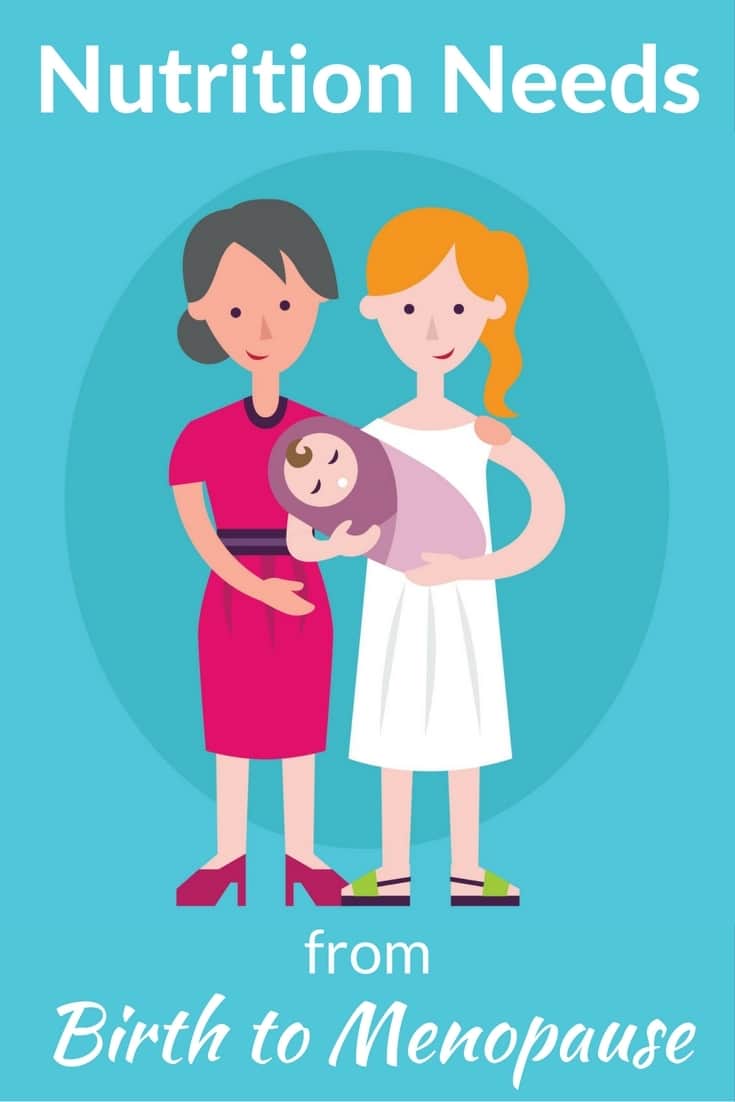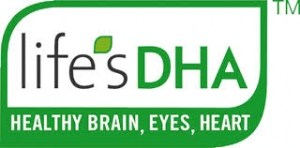My goal is to help busy moms raise happy, healthy families. I like to share tips and ideas, and I also try to research, study and share information that can help other moms make the best decisions for their families. When it comes to eating healthy, there’s a lot of conflicting information out there. Today, I’m going to focus on boiling it down to our body’s key nutritional needs from birth to menopause so that you know which nutrients are essential at each stage of development. Hopefully, this will help you make informed decisions about your family’s health.

Nutrition Needs of Babies
The first few years of development are critical to setting the stage for lifelong health. The most essential nutrients our babies need are:
- Calcium – vital for building strong bones
- Iron – critical for normal cognitive development
- DHA omega-3 – essential for brain and eye development
- Vitamin A – for vision and healthy skin
- Vitamin B Complex – helps the development and function of immune system, nervous system, healthy skin, muscle tone and cell growth
- Vitamin C – contributes to iron absorption
- Vitamin D – contributes to calcium absorption for normal bone growth and development
- Vitamin E – facilitates the protection of cells from oxidative stress
- Zinc – contributes to cognition and development and establishes healthy immune function
Nutrition Needs of Young Children
Since young children are still growing, they have many of the same nutritional needs as infants:
- Calcium
- Iron
- DHA omega-3
- Vitamin A
- Vitamin C
- Vitamin D
- Vitamin E
- Zinc
but because their bodies are larger, they have additional needs:
- Choline – essential for cell development and enhances the nervous system
- Fiber – contributes to normal bowel function
- Folate (one of the B vitamins) – necessary for cell development
- Magnesium – contributes to bone health and helps maintain muscle and nerve function
Potassium – works with sodium to control the body’s water balance to maintain blood pressure, also helps muscle function
Nutrition Needs of School-Aged Children
As kids get older, their nutritional needs start to look similar to those of adults. The key nutrients for school-aged children are:
- Calcium
- DHA omega-3
- Iodine – for healthy thyroid function
- Iron
- Vitamin A
- Vitamin B
- Vitamin C
Nutrition Needs of Teens
As a child’s body transitions to adulthood, these nutrients become more important:
- B Vitamins (specifically thiamin, riboflavin, and niacin) for normal energy-yielding metabolism
- Calcium – almost half of our skeletal growth occurs in adolescence so calcium is critical during this stage
- DHA omega-3 for maintenance of normal brain and vision function
- Iron – contributes to normal formation of red blood cells and haemoglobin
Zinc – contributes to normal carbohydrate metabolism
Nutrition Needs During Pregnancy
Pregnant women have increased nutritional needs due to the strain of pregnancy on their own body and for the healthy development of the baby.
- Beta Carotene – is a source of vitamin A and plays a role in the process of cell specialization
- Calcium – plays a role in the process of cell division and specialization
- Choline – contributes to normal lipid metabolism
- DHA omega-3 – supports the baby’s brain and eye development and growth
- Iodine – contributes to normal cognitive function
- Iron – contributes to the normal formation of red bold cells and haemoglobin
- Potassium – helps keep mom’s blood pressure stable
- Vitamin A – plays a role in the process of cell specialization
- Vitamin B2 (Riboflavin) – helps fight mom’s fatigue
- Vitamin B6 – contributes to the normal function of the immune system
- Vitamin B9 (Folic Acid) – folic acid intake increases maternal folate status; low maternal folate status is a risk factor in the development of neural tube defects in the developing fetus; also contributes to maternal tissue growth during pregnancy and to the reduction of tiredness and fatigue
- Vitamin B12 – essential for nervous system function
- Vitamin C – contributes to normal collagen formation for the normal function of bones and teeth, contributes to normal function of the immune system
- Vitamin D – contributes to normal absorption of calcium and phosphorus and maintenance of normal bones and teeth
- Zinc – plays a role in the process of cell division and normal fertility and reproduction
Nutrition Needs of Older Women
As we age, our bodies don’t heal as quickly and can slowly degenerate. Consuming the proper nutrients can help us remain vital and healthy well past our “prime.”
- Calcium – critical for bone health
- DHA and EPA omega-3s – supports heart health; studies show that DHA helps to maintain normal triglyceride levels and blood pressure.
- Vitamin B9 (Folic Acid) – contributes to normal blood formation, normal psychological function, normal function of the immune system and contributes to the reduction of tiredness and fatigue
- Vitamin B12 – contributes to the reduction of tiredness and fatigue, and to normal psychological function
- Vitamin D – contributes to normal blood calcium levels and normal absorption/utilization of calcium and phosphorus. Vitamin D helps to reduce the risk of falling associated with postural instability and muscle weakness.
Sources of Essential Nutrients
Calcium – milk, soy milk, almond milk, coconut milk, yogurt, cheese, sardines, chickpeas, white beans, fortified cereal, sardines, tofu, salmon, collard greens
Choline – eggs, liver, peanuts, shrimp, scallops, chicken, turkey, tuna, cod
DHA – algae, anchovies, salmon, herring, mackerel, tuna, halibut
- Important Notes:
- Although DHA is a type of omega-3 fatty acid, it is different from ALA (found in flaxseed, walnuts, canola oil). DHA supports brain development and function, visual development and function, and heart health through maintenance of normal blood triglycerides levels. ALA simply acts as a source of energy.
- DHA from fish comes from the algae they consume. To make sure you’re getting a high-quality vegetarian source of DHA omega-3, look for the life’sDHA® logo on product packaging
Iodine – sea vegetables (e.g dried seaweed), scallops, cod, yogurt, shrimp, turkey breast, navy beans, tuna, eggs, baked potatoes, strawberries, cranberries
Iron – red meat, pork, poultry, seafood, beans, dark leafy greens (e.g. spinach), dried fruit, iron-fortified cereals
Potassium – avocado, spinach, sweet potato, coconut water, yogurt, white beans, bananas, acorn squash
Vitamin A – sweet potatoes, carrots, dark leafy greens, winter squash, lettuce, dried apricots, cantaloupe, bell peppers
Vitamin B2 (Riboflavin) – beef liver, lamb, milk, yogurt, mushrooms, spinach, almonds, sun-dried tomatoes
Vitamin B6 – fish, beef liver, potatoes, non-citrus fruit, enriched cereals, soy products
Vitamin B9 (Folic Acid) – dark leafy greens, asparagus, broccoli, citrus fruits, beans, avocado, okra, cauliflower
Vitamin B12 – meat, fish, dairy products, eggs, fortified cereals, salmon
Vitamin C – oranges, red peppers, kale, Brussels sprouts, broccoli, strawberries, grapefruit, pineapple, kiwi, cantaloupe
Vitamin D – Tuna, salmon, beef liver, cheese, eggs, vitamin D fortified foods (milk, orange juice, cereal)
Vitamin E – almonds, sunflower seeds, swiss chard, mustard greens, spinach, kale, vegetable oils (e.g. olive oil), peanuts, avocado, shrimp, asparagus
Zinc – spinach, beef, shrimp, kidney beans, flax seeds, pumpkin seeds, oysters, garlic, peanuts
You may have noticed that several foods are good sources of multiple nutrients. By eating a well-balanced diet that incorporates powerhouse foods like dark leafy greens, eggs, avocado, berries, and seafood, you can meet most of your nutritional needs at every stage of life. If you have dietary restrictions or have picky eaters, look for fortified foods to help ensure you get the right nutrients. This can be difficult when trying to make sure you get adequate amounts of DHA since it’s predominantly found in algae and fish, so remember to look for the life’sDHA® logo. You’ll find it on products and brands you already know and love.
This post sponsor – life’sDHA® – educated me on the importance of nutrients – including DHA omega-3 – for all stages of life.


